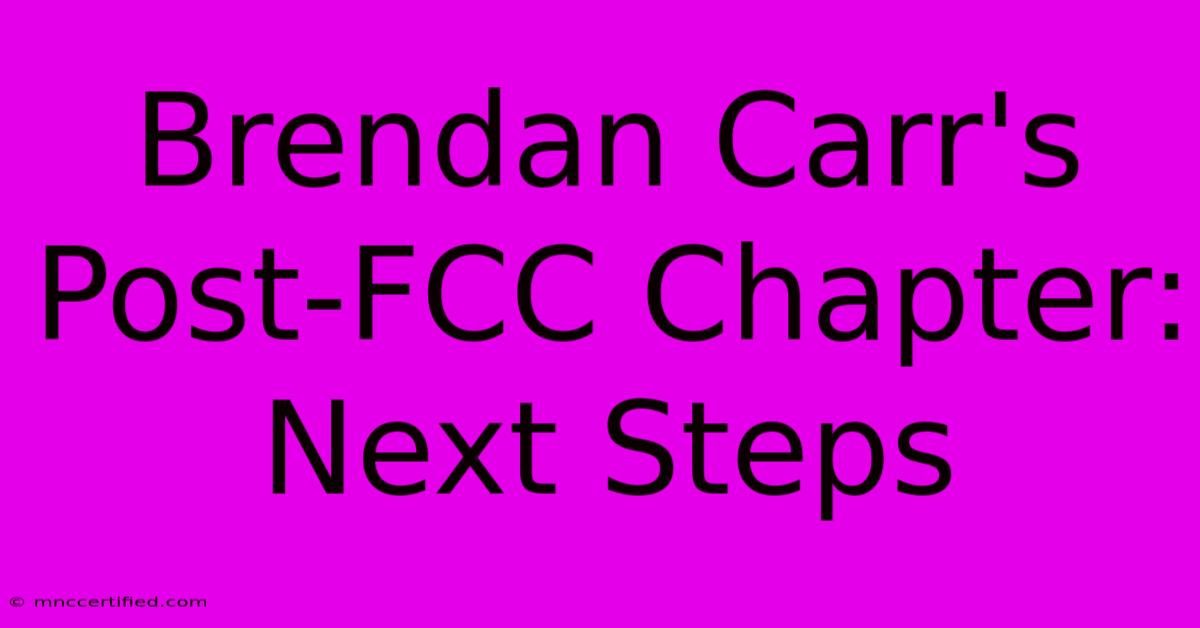Brendan Carr's Post-FCC Chapter: Next Steps

Table of Contents
Brendan Carr's Post-FCC Chapter: Next Steps
Brendan Carr's departure from the Federal Communications Commission (FCC) concluded a significant chapter in his career, marked by outspoken conservatism and a strong emphasis on deregulation. Now, the question on many minds is: what's next for this influential figure in American telecommunications policy? This article explores potential avenues for Carr's future endeavors, considering his expertise, past pronouncements, and the current political landscape.
A Legacy of Conservative Influence
Carr's time at the FCC was characterized by his persistent advocacy for conservative principles. He championed policies aimed at reducing regulatory burdens on businesses, fostering competition (though often in a specific, targeted manner), and promoting free speech principles in the digital age. His strong stance against what he perceived as excessive government intervention in the telecommunications sector cemented his reputation as a key player in the ongoing debate surrounding net neutrality, media ownership, and the role of technology in society. This legacy will undoubtedly shape his future pursuits.
Key Policy Positions and Their Implications
Several key policy positions highlight Carr's likely future directions:
-
Net Neutrality: Carr's vocal opposition to net neutrality regulations suggests a continued involvement in debates surrounding internet access and its regulation. He might become involved with think tanks, lobbying groups, or even directly in policy-making roles within the private sector.
-
Big Tech Regulation: His criticisms of large technology companies suggest a potential focus on antitrust issues and the regulation of online platforms. This could translate into advisory roles for companies seeking to navigate the complex regulatory environment or involvement in legal challenges related to tech monopolies.
-
Media Ownership: Carr's views on media consolidation and ownership could lead him to roles within media companies or organizations advocating for specific regulatory frameworks.
Potential Future Avenues for Carr
Given his background and experience, several potential career paths emerge for Brendan Carr:
1. The Private Sector: Lobbying and Consulting
The private sector offers numerous opportunities for Carr's expertise. He could leverage his deep understanding of telecommunications policy to advise companies navigating regulatory complexities. Lobbying firms could also recruit him for his insights into FCC procedures and the political landscape influencing telecommunications. His expertise would be highly valuable to companies in the tech, telecom, and media sectors.
2. The Public Sector: Think Tanks and Academia
Carr's influence could extend through involvement with conservative-leaning think tanks, where he can shape policy debates and provide analysis on regulatory issues. His experience would be valuable to these organizations in developing policy recommendations and engaging in public discourse. Academic institutions might also recruit him as a visiting fellow or professor, providing a platform for him to share his insights and mentor future generations of policy experts.
3. Legal and Advocacy Roles
Carr's legal background makes him a suitable candidate for roles within law firms specializing in telecommunications, technology, and media law. He could represent clients facing regulatory scrutiny or engage in legal challenges concerning telecommunications policies. Alternatively, he could leverage his expertise to advocate for specific policy changes through public interest organizations aligned with his viewpoints.
The Broader Context: Political Landscape and Future Influence
Carr's future endeavors will undoubtedly be influenced by the broader political landscape. The ongoing debate regarding technology regulation, media consolidation, and the role of government in the digital age will continue to provide opportunities for his expertise. His network of contacts within the political establishment and his strong public profile will allow him to remain a significant figure in shaping future policies, regardless of the specific path he chooses.
In conclusion, Brendan Carr's post-FCC career holds significant potential for influence. His expertise and strong opinions are likely to find outlets across the private and public sectors, shaping the future of telecommunications policy for years to come. His future actions will be closely watched by those interested in the ever-evolving world of technology and regulation.

Thank you for visiting our website wich cover about Brendan Carr's Post-FCC Chapter: Next Steps. We hope the information provided has been useful to you. Feel free to contact us if you have any questions or need further assistance. See you next time and dont miss to bookmark.
Featured Posts
-
Ukraine North Korean Soldiers
Nov 19, 2024
-
Huda Beauty Sale Black Friday 2024
Nov 19, 2024
-
Smart Insurance By Solomon Agency
Nov 19, 2024
-
Meemic Insurance Customer Service
Nov 19, 2024
-
Gaudette Insurance Northbridge Ma
Nov 19, 2024